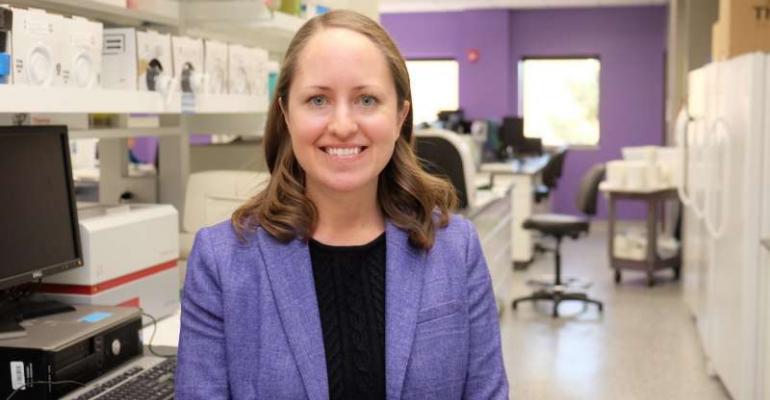Megan Niederwerder joins SHIC as new associate director
Kansas State University faculty member and researcher expected to begin new duties at Swine Health Information Center on April 1.
February 25, 2022

The Swine Health Information Center is pleased to announce Megan Niederwerder, DVM, PhD, has been chosen for the new role of associate director. Most recently an assistant professor in the Department of Diagnostic Medicine/Pathobiology, College of Veterinary Medicine at Kansas State University, Niederwerder has an expected start date of April 1 with SHIC.
"The SHIC mission is consistent with my professional goals of increasing the efficiency of pork production through improving swine health," Niederwerdersays. "It is an honor to be named the first associate director and I look forward to contributing to the breadth of swine health and disease objectives led by SHIC for the industry."
In November 2021, the National Pork Board Board of Directors provided an additional $15 million to fund the SHIC for another five-year period, through 2027. Subsequent to this extension, the SHIC Board of Directors approved adding the role of associate director for the organization.
"The addition of Megan as associate director will help to make SHIC even more impactful and able to meet the needs of pork producers," says SHIC Executive Director Paul Sundberg, DVM, PhD, DACVPM. "We'll be able to multiply return-on-investment results as SHIC remains faithful to its mission to protect the health of the U.S. swine herd through comprehensive preparedness, monitoring, response and communications activities."
Specifically, Niederwerder will assist Sundberg in directing overall expectations and accountability as well as ensuring quality programs and services. This includes collaborating to provide oversight and implementation of the Center's budget, long range planning and strategic initiatives. Additionally, Niederwerder will interact closely with the pork community, assisting efforts to build awareness of SHIC, establish and maintain working relationships in the pork industry and successfully meet the Center's mission.
"SHIC continues to deliver beyond expectations to the swine industry," says Daryl Olsen, DVM, chair of the SHIC Board of Directors. "As the scope of our efforts in prevention, preparedness and response to emerging and potential foreign swine disease issues grows, so does our need for qualified leadership for the organization. Megan will be an outstanding addition to SHIC with her experience, passion and knowledge."
After earning her veterinary degree at Kansas State University, Niederwerder was in clinical practice for three years. Upon her return to Kansas State, she obtained her PhD in infectious diseases of swine, including research projects involving porcine reproductive and respiratory syndrome virus, porcine circovirus type 2 and porcine epidemic diarrhea virus.
"My dissertation research as a veterinarian scientist was related to the clinical response of swine to viral diseases," she says. "I developed a passion for the health and prevention of disease in swine as well as productivity of the U.S. pork industry."
During her time as a faculty member in academia, Niederwerder led an internationally renowned research program on viral diseases of swine with focus areas on the risk and mitigation of African swine fever virus introduction through feed and the use of the gut microbiome as an alternative tool for porcine respiratory disease. "I see improvements in swine health to be two-fold, including increasing the health of swine with endemic disease exposure and decreasing the risk of foreign animal disease exposure," Niederwerder says.
"SHIC is well-positioned to lead the generation of novel swine health data, be the foremost global swine disease news source, and address challenges to swine health with creative solutions for stakeholders. I look forward to advancing the SHIC mission through the role of associate director and working with Paul, the SHIC Board of Directors and the SHIC Working Groups to serve the needs of U.S. pork producers."
Source: Swine Health Information Center, which is solely responsible for the information provided, and wholly owns the information. Informa Business Media and all its subsidiaries are not responsible for any of the content contained in this information asset.
You May Also Like


